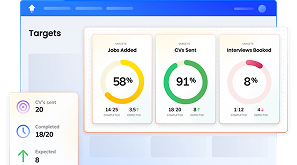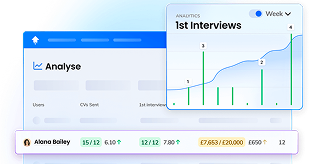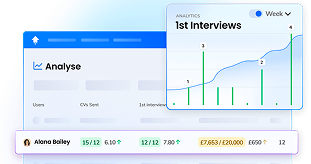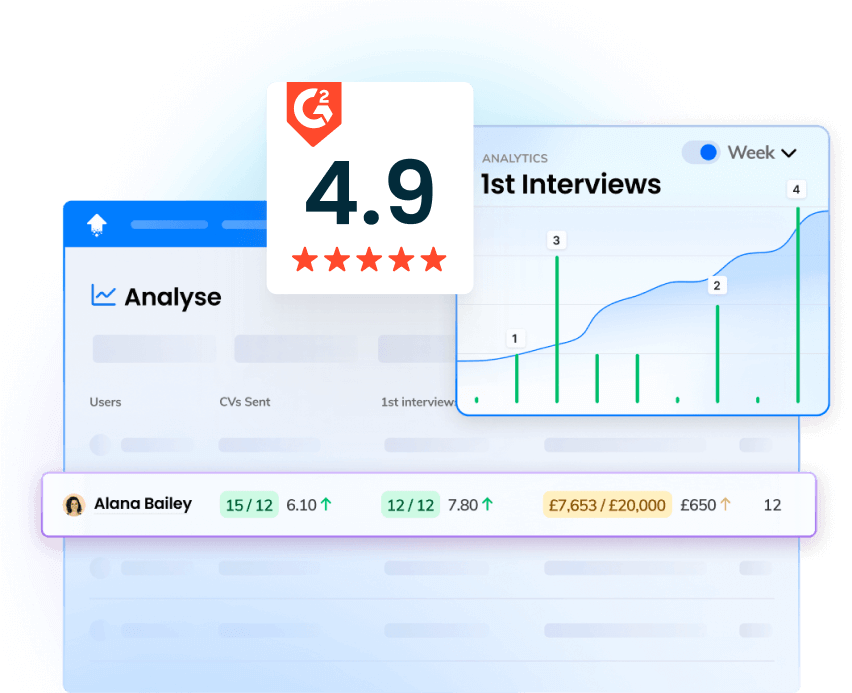Recruiters are generally competitive by nature.
With the right recruitment incentive structure, recruitment leaders can motivate recruiters to consistently perform at a high level.
There’s no question about it—having a strong recruitment incentive plan is essential for building a highly motivated team. Incentives provide a clear compensation structure, outlining what is expected and what recruiters can gain for delivering high performance. A well-designed incentive program ensures that recruiters know their hard work will be rewarded with prizes that truly matter to them.
From a leadership perspective, structured recruiter incentive plans promote team performance, encourage collaboration, and help managers address challenges effectively. By aligning specific performance metrics with achievable targets, agencies can drive revenue targets, improve recruiter performance, and enhance recruitment metrics.
The recruitment industry is high-pressure, and without proper incentives, recruiting teams can quickly lose motivation. However, agencies that use monetary bonuses, performance-based incentives, and even non-monetary incentives can improve employee retention and boost staffing agency success.
A well-structured bonus structure can also contribute to long-term growth by reducing hiring costs and improving retention rates. Whether through referral bonuses, paid time off, or financial rewards, the right incentives keep recruiters engaged and committed to the company’s success.
By regularly reviewing incentive plans and adjusting them to meet industry standards, agencies can ensure their recruitment team stays motivated and aligned with company goals. An effective recruitment incentive service agreement ultimately helps agencies exceed targets, bring in suitable candidates, and contribute to overall success.
What are Recruitment Incentives?
But what exactly do we mean by recruitment incentives?
Recruitment incentives are rewards or benefits offered to recruiters in exchange for achieving specific performance metrics set by managers.
These can be monetary bonuses, such as performance bonuses or referral bonuses, that top up recruiters' base salary. Alternatively, they can be non-monetary incentives, including career development opportunities, flexible work arrangements, or additional paid time off.
In recruitment agencies, a strong recruitment incentive plan plays a crucial role in motivating recruiters and ensuring team performance aligns with agency's goals. Recruitment leaders use incentives strategically to address problem areas in the hiring process.
For example, is your team struggling to find a qualified candidate for a tough role? Offering an incentive program for filling this job opening means recruiters will laser-focus on sourcing suitable candidates.
Is your time to fill lagging behind industry standards? Setting achievable targets tied to performance-based bonuses can help recruiting teams accelerate the recruitment process.
If your team lacks motivation, introducing a bonus structure that encourages friendly competition — where individual recruiters or the entire recruitment team work toward an incentive — can help.
Furthermore, some agencies implement a recruitment incentive service agreement or a retention incentive service agreement to support long-term growth. These agreements, set out before a newly appointed employee’s first day, ensure that new hires stay for a set period while receiving financial rewards at key milestones. This approach helps boost employee retention, reduce hiring costs, and improve revenue generated over time.
Benefits of Implementing Recruitment Incentives
The advantages of implementing recruiter incentives are numerous — here are some of the top benefits.
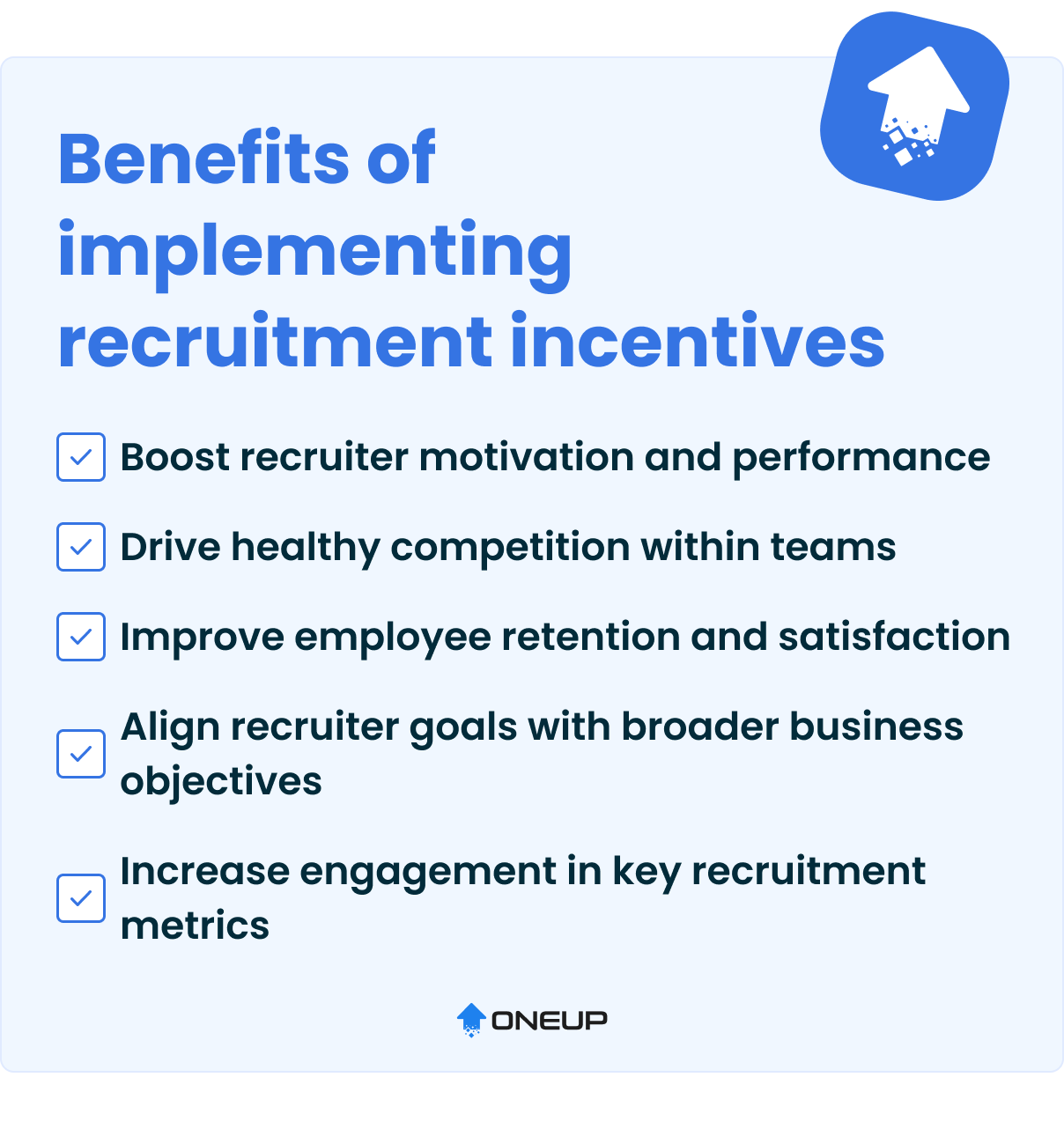
#1 Boost Recruiter Motivation and Performance
Incentives are tangible rewards for achieving targets, which create a clear link between effort and reward.
And with strong incentives on the table, recruiters feel like their employer values their work.
This motivates recruiters to work efficiently, improve results, and stay focused, ultimately enhancing both individual and team performance.
#2 Drive Healthy Competition Within Teams
Recruitment competitions are a tried and tested way to motivate teams.
But this tactic only works if there's a strong incentive attached.
With a truly appealing prize on the table, it's easy to drive healthy competition within your teams.
After all, when a recruiter sees a colleague outperforming them, they'll strive to hit that goal first in order to secure that incentive.
#3 Improve Employee Retention and Satisfaction
Recruitment incentives recognise and reward hard work, fostering a positive work environment.
This, in turn, boosts employee retention and satisfaction.
What's more, incentives such as bonuses, career development, or extra holidays make recruiters feel valued, increasing job satisfaction.
Meanwhile, socially oriented incentives such as work parties or dinners encourage team bonding.
All of this enhances loyalty, reduces turnover, and encourages long-term commitment to the agency and its staff.
#4 Align Recruiter Goals With Broader Business Objectives
Harness the power of recruitment incentives to ensure all your recruiters are on the same page as you.
By setting SMART goals based around their broader business objectives — and attaching appealing incentives to these targets — recruitment leaders are empowered to grow in their desired strategic direction and tackle issues within the agency.
It encourages recruiters to focus on outcomes that drive agency success, ensuring their efforts contribute directly to the company's overall growth and strategic targets.
#5 Increase Engagement in Key Recruitment Metrics

Recruitment incentives link rewards to key recruitment metrics, such as placements, calls, and candidate submissions.
Without an incentive, you can set recruiters' goals to boost these numbers, but you're unlikely to get the same level of engagement as you would with a reward attached to the target.
7 Examples of Recruitment Incentives for Agencies
The benefits of implementing a well-structured incentive programme in recruitment agencies are clear.
But what should these programmes look like?
Here are seven examples of the best incentive plans for recruiters, ready to be rolled out in your agency.
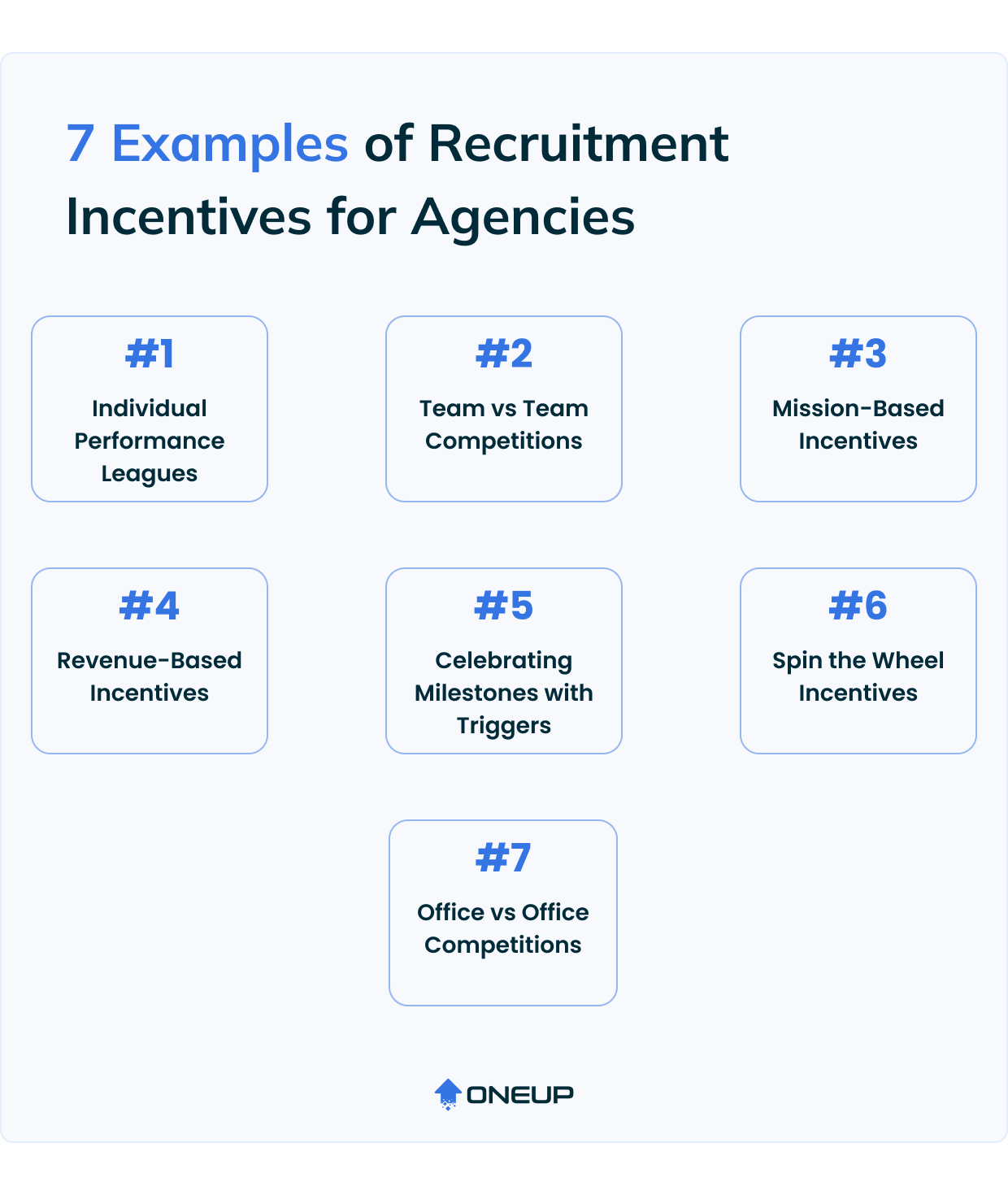
#1 - Individual Performance Leagues
One of the most effective incentive programmes is setting up individual performance leagues for recruiters.
What does this look like?
Invest in software like OneUp, which automatically tracks key metrics and progress towards goals in real-time and has a leagues feature.
Make sure your leagues are prominently displayed on screens around your office and accessible for remote workers.
Now, decide on exactly how you're going to run your league.
Start with your metrics — what would you like to see your recruiters do more of?
Perhaps you want to motivate them to make more calls and placements, for example?
Next, consider the time frame you want to run your leagues over.
If you choose a weekly time frame, the incentives will be smaller, but recruiters are less likely to lose motivation in the long term if they're at the bottom of the leaderboard, as it all resets on Monday.
A monthly league, meanwhile, could offer a more substantial prize that's seriously worth putting in the work for.
Each recruiter will compete as an individual, with their performance tracked and ranked alongside that of their colleagues on your leaderboards.
At the end of the defined period, the top performer secures the incentive.
Here's a creative real-world example of the individual league system with added competitiveness.
One company has set up multiple leagues where individuals compete to be the best performers.
But instead of sticking to a single league, they launched several, in the style of football leagues.
Each week, employees are promoted and relegated between each league.

#2 - Team vs Team Competitions
If your recruitment agency is big enough to have more than one team — for example, you might have a contract and permanent team — consider launching team vs team competitions.
This can be set up in the same way as leagues where individuals compete.
However, instead of every recruiter being tracked as an individual, all of their performances feed into their team results.
This might sound like a lot of maths, but OneUp can automate this process — and even has an 'averaged teams' feature to balance out teams of different sizes.
While this boosts competition between teams, it should also promote collaboration within those groups.
And if the prize is something the whole team can enjoy together, such as a dinner or an experience day, it can be great for team bonding too.
#3 - Mission-Based Incentives
Mission-based incentives are super useful for tackling a performance issue or hitting a specific goal faster.
Set missions focused on specific goals.

For example, perhaps the number of upcoming candidate interviews is a little on the low side.
In this case, you might set a mission for an individual or team to schedule [X number] of candidate interviews within the next month.
The first person to achieve this mission, or hit the stretch target, unlocks the incentive.
#4 - Revenue-Based Incentives
Metrics like time-to-hire and interviews scheduled all contribute towards the revenue each recruiter is bringing in.
But if you want to get straight to the point, consider creating a leaderboard for monthly or quarterly revenue.
Reward top performers with incentives like bonuses, early finishes, or even holiday packages.
Revenue-based incentives can be especially effective as they tie your agency's ultimate goal — making money — into how much your team is being rewarded.
Furthermore, in a competitive profession like recruitment, employees can take pride in knowing exactly how much revenue they contribute to the business.
#5 - Celebrating Milestones with Triggers
If you use OneUp, you can trigger an automated celebration when a recruiter hits a target or passes a milestone on their way to a goal.
Ideas for celebrations include favourite songs, video messages, MS Teams flashes, automatic notifications, and office TV announcements.
The milestones themselves can also be linked to incentives, with an initial lump sum payment for hitting a milestone being followed up by a final lump sum payment when recruiters reach their ultimate goal.
#6 - Spin the Wheel Incentives
Inject an extra dose of fun into the proceedings by taking your gamification to the next level.
Instead of defining the reward for the top performer ahead of time, create a 'spin the wheel' end game.
The wheel should contain a number of attractive rewards, from vouchers to early finishes.
The winning recruiter simply spins the wheel to find out which one they've won.
#7 - Office vs Office Competitions
Does your agency have multiple offices?
If so, this is another opportunity to bring out your recruiters' competitive sides.
Set up a leaderboard in which different branches compete against each other — for example, UK vs US offices — with a prize like a team social or company holiday for the triumphant office.
If you go down this route, it's essential to ensure the same real-time leaderboard is displayed across all your offices, and remote workers can access it easily.
Prize Ideas for Recruitment Incentives
It's important not to let your incentives get stale, as, after a while, their motivational power may start to falter.
Ensure you always include a good sprinkling of monetary bonuses (always a safe bet), but complement these with a wide variety of creative incentives.
Here are some ideas to inspire you:
- Performance-based bonuses for meeting or exceeding targets
- Commission on successful hires
- Extra holiday days, early finishes, or paid time off
- Public recognition or awards like a 'Recruiter of the Month' scheme
- Career development opportunities, e.g., training, certifications
- Flexible work arrangements such as remote working or compressed hours
- Team-building events or social activities like dinners and retreats
- Gift vouchers for shopping, holidays, or fine dining, for example
- Tangible prizes like gadgets or subscriptions
- Office perks, e.g. free lunches, wellness programs)
- Promotions or leadership opportunities
- Profit-sharing or equity options in the business
- Recognition (e.g., "Recruiter of the Month" or leaderboard shoutouts).
How OneUp Enhances Recruitment Incentives

When you're shelling out for recruitment incentives, you want to get your money's worth.
OneUp's recruitment analytics suite and gamification features help to deliver ROI on your incentivisation strategy.
Here's how you can use OneUp to make sure your recruitment incentives pack a punch.
Leagues and Leaderboards

OneUp's leagues and leaderboards track individual and team performance metrics easily and in real time.
You can create leaderboards based on any target you set your team, and then connect them to your in-office TV system so everyone can see where they stand.
Triggers for Celebrations

Recognition is critical for motivation — and OneUp's celebration triggers mean you never miss an important moment.
You can automate celebrations, such as personalised songs and automated broadcasts, to play across your in-office screens when a recruiter hits a goal.
Seamless CRM Integration
OneUp offers a wide range of integrations, ensuring your incentives run smoothly without the need to overhaul your existing systems.
What's more, OneUp acts as a single source of truth — pulling data from across your tech stack to populate custom dashboards.

You can refresh and view data from across your tech stack — including CRM, VoiP, and Timesheets software — in real-time.
Gamification for Motivation

Add a fun, competitive edge to daily recruitment activities with OneUp's gamification features.
Build custom dashboards, leagues, leaderboards, and missions around goals that matter to you, and view recruiter performance towards these targets in real-time.
Best Practices for Running Effective Recruitment Incentive Programmes
Ready to launch your incentive plan for recruiters and motivate your team to success?
Keep these best practices in mind.
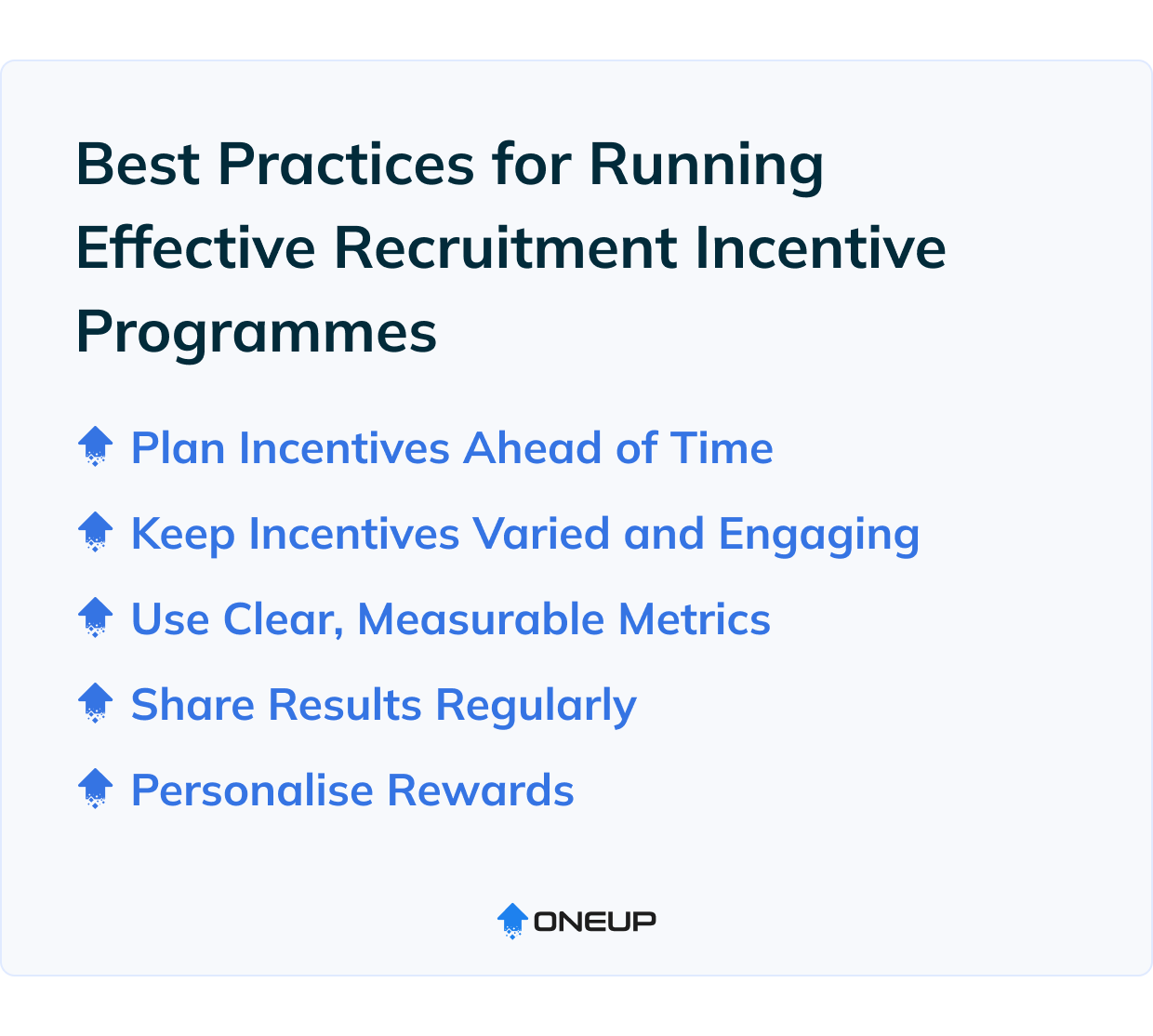
#1 Plan Incentives Ahead of Time
In order to tempt your team with attractive rewards and build a well-planned incentivisation strategy, it's essential to plan your incentives ahead of time.
Planning your monthly, quarterly, and yearly incentives ahead of time ensures you'll have the budget to deliver on your promises.
It also allows you to ensure you build up to big incentives and ensure they are timely, relevant and do their job.
#2 Keep Incentives Varied and Engaging
Don't allow your incentives to become stale and lose their motivational power.
Mix up your incentives by switching between individual and team-based rewards and considering when they will be handed out.
For example, holiday-based prizes work great ahead of summer, while the festive season is a great time to hand out monetary bonuses or dining vouchers.
#3 Use Clear, Measurable Metrics
Competitions must be run transparently and fairly.
Suppose a recruiter feels like incentives are being handed out to people who don't deserve them. In that case, this will likely demotivate that individual — the opposite of the effect you're trying to achieve.
Fortunately, it's hard to argue with cold, hard metrics.
Base your competitions around targets with clear, measurable KPIs.
#4 Share Results Regularly
To really engage your team with your competitions, they need to be able to track their progress themselves.
This can be achieved by displaying real-time leaderboards, leagues, and missions on screens around the office — and handing out a link for any remote workers.
But it's still vital that you engage with your team around competitions, too.
This can be achieved through weekly team meetings, personal development sessions, and announcing when a recruiter or team has won a competition.
#5 Personalise Rewards
Personalising recruitment incentives is important because it recognises individual recruiters' diverse motivations and needs.
After all, what motivates one person might not appeal to another.
For example, some may prioritise financial rewards, while others value flexible working arrangements or career development opportunities.
By tailoring incentives, agencies can ensure each recruiter feels valued and motivated, leading to increased engagement, job satisfaction, and overall performance.
Personalised incentives also foster a stronger connection between recruiters and the agency's goals.
Conclusion
Implementing recruitment incentives is vital for boosting team performance and retaining talent.
Incentives motivate recruiters to meet targets, improve efficiency, and align their efforts with business goals.
Recognising and rewarding achievement fosters job satisfaction, enhances loyalty, and reduces turnover, creating a more engaged and high-performing recruitment team.
You can streamline incentive-based performance management with recruiting gamification software OneUp.
Integrate the software with your tech stack for a single source of truth that pulls data from other systems and feeds it directly into your custom dashboards, leaderboards, leagues, and missions.
It's super easy to set up competitions on OneUp, empower your team to track their progress, and then celebrate their wins with automated celebrations.
Find out more about creating your own customised recruitment incentive programme with OneUp. Book your demo here today.
